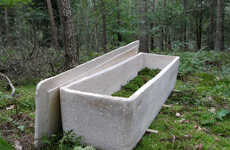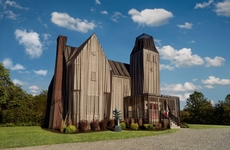
Roomates for the Departed
References: timesonline
We like to assume that we will finally be at peace and let our souls go to rest when we die. But what if we don't like our new roommates? This could be a reality our ghosts may have to face in the future, as some cemeteries run out of burial space. In London, for example, 1,000 graves at one cemetery have been “reclaimed†by the city since 2004.
Forced to shack up with fellow corpses, the newly deceased may face shared accommodations with other members of the departed. The only difference between a bad roommate in real life, and bad dirtmate? We don't have any choice in who we're laid next to, or on top of as the case may be.
An investigation by The Times showed that graves over 75 years old are being reused because of lack of land in London. The government has the right to remove burial stones and repossess plots that have been neglected.
What would be more wrong, removing the remains of the previous tenant, or simply burying the newly departed on top? In London, they've decided just to place new coffins on top of the remains—with the permission of family members, of course.
Here's the freakiest part: some people are reusing tombstones and writing new inscriptions on the back!
Director of the Cemetery Research Group at the University of York, Julie Rugg, doesn't see what all the commotion is about. “We're not talking about digging up your granny tomorrow, we're talking about reusing graves often from more than 100 years ago.â€
If you have a tendency to need your own space, you better reserve your grave plot now. Or, you could just go ahead with good ol' cremation, as 74 per cent of Brits do.
Forced to shack up with fellow corpses, the newly deceased may face shared accommodations with other members of the departed. The only difference between a bad roommate in real life, and bad dirtmate? We don't have any choice in who we're laid next to, or on top of as the case may be.
An investigation by The Times showed that graves over 75 years old are being reused because of lack of land in London. The government has the right to remove burial stones and repossess plots that have been neglected.
What would be more wrong, removing the remains of the previous tenant, or simply burying the newly departed on top? In London, they've decided just to place new coffins on top of the remains—with the permission of family members, of course.
Here's the freakiest part: some people are reusing tombstones and writing new inscriptions on the back!
Director of the Cemetery Research Group at the University of York, Julie Rugg, doesn't see what all the commotion is about. “We're not talking about digging up your granny tomorrow, we're talking about reusing graves often from more than 100 years ago.â€
If you have a tendency to need your own space, you better reserve your grave plot now. Or, you could just go ahead with good ol' cremation, as 74 per cent of Brits do.
Trend Themes
1. Reusing Grave Plots - Reusing older graves due to the lack of land can be a potential trend. Cemetery owners can offer a new concept for shared graves and added services for tomb maintenance.
2. Cemetery Management Services - As cemeteries face the challenge of limited spaces, there's an opportunity for management services to provide innovative solutions such as tombstone recycling.
3. Sustainable Burial Practices - With limited burial spaces and the impact of traditional burials on the environment, there's a trend towards eco-friendly and cost-effective cremation services.
Industry Implications
1. Cemetery Industry - The cemetery industry can explore opportunities in shared grave concepts and developing sustainable burial practices.
2. Funeral Services Industry - The funeral services industry can rethink the way they offer their services and products to cater to limited spaces and sustainability.
3. Eco-friendly Industry - With the trend towards sustainable burial practices, the eco-friendly industry can provide innovative solutions for eco-friendly coffins, cremations and urns.
2.2
Score
Popularity
Activity
Freshness























